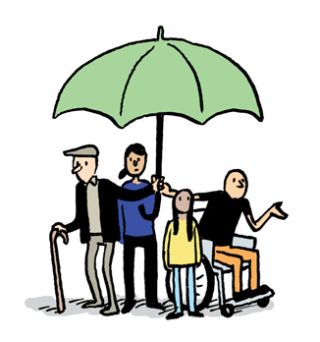Thriving Community and Voluntary sector is key to vibrant communities

Community and Voluntary organisations have a long history of providing services and infrastructure at local and national level. They are engaged in most, if not all, areas of Irish society. They provide huge resources in energy, personnel, finance and commitment that, were it to be sourced on the open market, would come at considerable cost to the State. They have developed flexible approaches and collaborative practices that are responsive and effective in meeting the needs of diverse target groups. There are an estimated 189,000 employees in registered charitable organisations in Ireland. Over half of all registered charities have between one and 20 volunteers, with three per cent having 250 or more. It is estimated that the value of this volunteering work, using the minimum wage, is €648.8 million per year (this increases to €1.5 billion when using the average income)[1]. It is important to note, however, that this report is based on those charities that are required to register with the Charities Regulator, which accounts for approximately 300,536 volunteers. The CSO put the number of volunteers at nearer one million, when sporting, human rights, religious and political organisations are included.
During the recession Government funding for the Community and Voluntary sector reduced dramatically and this has not, as yet, been restored. Whilst the Covid-19 related funding is welcome, it is essential that Government appropriately resource this sector into the future and that it remains committed to the principle of providing multi-annual statutory funding. The introduction of the Charities Regulatory Authority, the Governance Code and the Lobbying Register in recent years is intended to foster transparency and improve public trust. However, it is essential that the regulatory requirements are proportional to the size and scope of organisations, and do not create an unmanageable administrative burden which detracts from the core work and deters volunteers from getting involved.
In August 2019, the Department of Rural and Community Development published Sustainable, Inclusive and Empowered Communities: A Five-Year Strategy to Support the Community and Voluntary Sector in Ireland 2019-2024[2]. This Strategy sets out the vision for community and voluntary sector development over the next five years. It contains a series of 11 policy objectives across all stakeholders, from Public Participation Networks to civil society organisations to local and national Governments.
Social Justice Ireland recommends that implementation of the five year Strategy be resourced in a way that recognises the important role of the Community and Voluntary Sector, the local role of the PPNs, and the challenges of community development, and seeks to generate real partnerships between communities and agencies. We welcome the publication of the National Volunteering Strategy 2021 – 2025 which was developed in tandem with the Strategy and the Social Inclusion Strategy so as to ensure policy coherence across all three strategies. The five high level objectives and 56 associated actions are designed to support communities and the community and voluntary sector and seek to develop and enhance the role of the volunteer on an individual level and encourage volunteering in general as a way to develop vibrant communities.
Community and Voluntary Sector
The cuts to funding for the Community and Voluntary sector made during the last recession have yet to be restored. Covid-19 has again highlighted the importance of communities. This support must now be formally recognised with investment in programmes that support community engagement; deal with deficit demand; tackle social exclusion; and sustain communities. In addition, increased administrative and regulatory duties imposed upon this sector mean that resources that would otherwise be dedicated to frontline and core services are diverted to administration. This must be streamlined with recognition given to the size and capacity of the range of organisations within the sector.
Public Participation Networks (PPNs)
The PPNs are the primary mechanism for Local Authority engagement with communities. While this is an important step in fostering a more democratic local government structure, there is some way to go to build real participation and partnership in local government decision-making. Investment in community engagement is needed to support capacity building and the establishment of local dialogue forums to support participation in the development of the Local Economic and Community Plans, and the Local Authority budgets.
Social Justice Ireland recommends increased resources for measures to support social inclusion of the most marginalised communities and groups in society. Marginalised communities and those living in poverty require sustainable community development to ensure a long-term response to social exclusion and poverty within communities is addressed, enabling communities to identify their needs and mobilise a collective response to relevant policy development processes.
[1] Indecon, 2018. Registered Irish Charities Social and Economic Impact Report 2018. s.l.:s.n
[2] Department of Rural and Community Development, 2019. Sustainable, Inclusive and Empowered Communities: A Five-Year Strategy to Support the Community and Voluntary Sector in Ireland 2019-2024. Dublin: Government of Ireland.

GIVING A VOICE TO THOSE
WHO DON’T HAVE A VOICE
When you support Social Justice Ireland, you are tackling the causes of problems.
